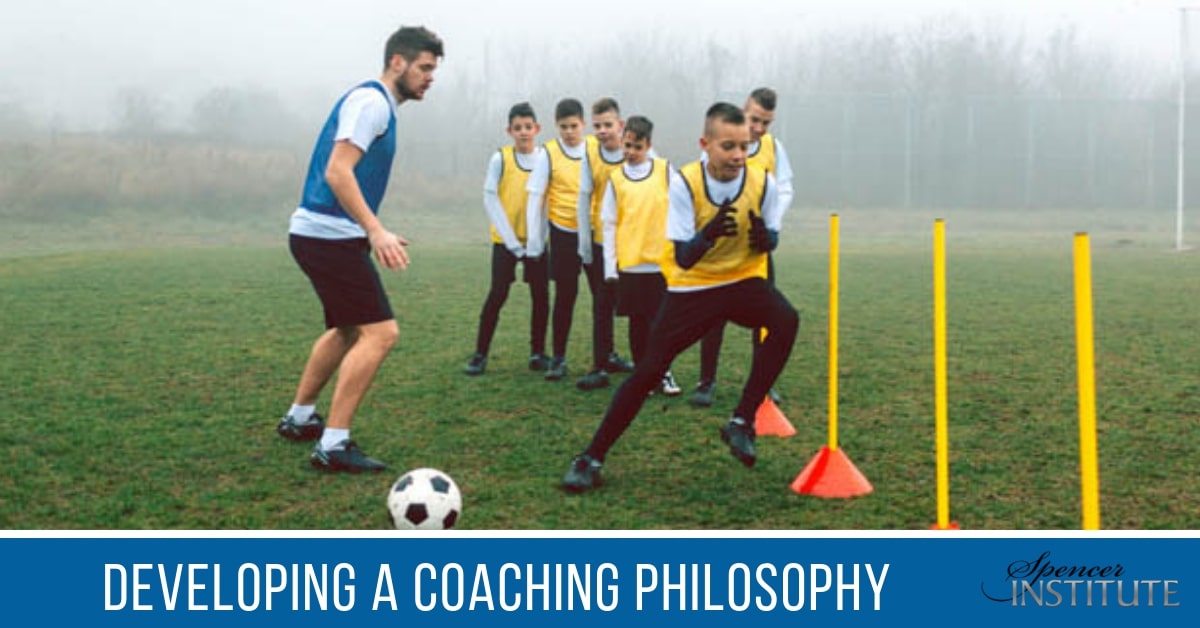 Philosophical considerations become important because coaches have to decide whether to develop general athleticism first and sport-specific athleticism second – or develop a quick fix for instant success.
Philosophical considerations become important because coaches have to decide whether to develop general athleticism first and sport-specific athleticism second – or develop a quick fix for instant success.
But this disrupts normal progress and may trigger the participant or resort to a quick fix, instant success method. The latter tends to backfire, often resulting in stale phases that interfere with the athlete’s normal progress.
This quick fix method tends to create frustration and motivational problems; this may trigger the athlete to drop out of the activity.
A well-constructed coaching philosophy operates as the driving force for:
- The entire program and future program aims
- The athletes’ welfare
- Teaching/coaching staff interactions
- The selection of management styles
- Support-staff cooperation and effectiveness
- Parental involvement
- The monitoring/evaluation process
- Training Versus Education
Coaches need to decide if their only role is to train the athlete or if it includes educating the individual as well. The coach also needs to decide if their coaching philosophy and process is going to be one- dimensional or multidimensional.
One-Dimensional Method
A one-dimensional method develops the physical aspects of the athlete (body/physique/physiology) through physical programs and training.
Multidimensional Method
- Develops physical skills and proper techniques.
- Provides knowledge and new information.
- Fosters social-psychological, emotional aspects.
- Provides fun and motivation.
- Enhances communication and social skills.
- Facilitates the learner/athlete’s ability to make independent decisions.
- Encourages moral reasoning and the assumption of responsibility for one’s decisions and actions.
Program Success and Coaching Philosophy
One should always remember that the best teacher for the coach is the athlete.
The approach to teaching/coaching is based on major philosophical questions to establish and build an operational framework. The success of any program depends ultimately on a fundamentally sound philosophical approach that examines the following important questions:
Who are we, as Coach and Athlete? (questions the nature of being),
Who am I, as a person and as the coach? What is the nature of the learner/athlete?
What Is Knowledge? (questions the nature of knowledge)
What current knowledge base (information) do I need as a person/coach?
What knowledge base (information) does the learner/athlete need to become a successful individual and athlete?
What Are Moral Values? (questions the nature of values:
what is good – what is bad – moral judgments) The discussion entails what constitutes moral and non-moral values for the common (societal) good and the effects non-moral values have on moral beliefs and action.
What are my value systems as a person and as a coach?
What values are essential for the learner/athlete in order to function fully and independently as an individual and as an athlete in current times?
How do I facilitate and guide this process in order to develop the individual/athlete so that he or she may feel empowered to think critically, learn to reason morally, and learn to shoulder consequences for actions or behavior? In other words, how do I as a person/coach teach responsibility to the prospective athlete? What learning episodes must I provide to teach those important principles?
How do I Teach Respect For:
- The self
- Teammates
- The coach
- Other teams and athletes
- Referees
- The sport environment
- Property
There can be no true sport without fair play, and without fair play, sport has no future.
How do I Teach Fair Play, Honesty, and Integrity?
Coaches have to make the athlete the center of their teaching/coaching environment instead of basking in the traditional power role. In the end, coaches need to decide on the appropriate timing to let go of the power base and empower athletes instead. Likewise, they are obligated to teach athletes strategies to handle these newly acquired roles and inherent responsibilities.
Ready to Jump into your Coaching Career?
The Youth Performance Coach Certification is designed for new and advanced coaches and trainers who want to specialize in the areas of youth athletics, youth mentorship and leadership for the next generation. If you are new to youth coaching, training and mentoring, this is a great launching point for your career. You will gain valuable insight that will give you the skills needed to make a positive change in the lives of youth.
If you are passionate about helping people and living a fulfilling life, we can help you achieve your dreams right now. The Life Strategies Coaching Certification Course combines the latest advancements in human potential and neuroscience with proven methods of success used by the world’s most productive people.
That’s it for now.
Take action!
PS: Click here to see many helpful business/career resources










